The liver is one of the body’s most vital organs, responsible for filtering toxins, producing bile for digestion, and metabolizing nutrients. In today’s fast-paced world, maintaining liver health has become more important than ever. Fortunately, nature provides us with a variety of plants that can support liver function and promote detoxification. Below are five of the top plants known for their liver-protective properties.
Milk thistle
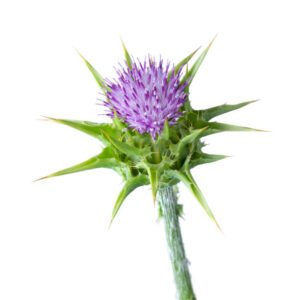
Milk thistle (Silybum marianum) is a powerful herbal remedy that has been used for centuries to support liver health. Known for its active compound, silymarin, this plant offers a range of benefits, particularly when it comes to protecting and regenerating liver cells. Below, we explore the key benefits of milk thistle for liver health and why it has become a popular natural treatment for liver conditions.
1. Protects Liver Cells from Damage
One of the most significant benefits of milk thistle is its ability to shield liver cells from damage. Silymarin, the active ingredient, acts as an antioxidant, neutralizing harmful free radicals that can cause oxidative stress in the liver. This protection is particularly important for people exposed to environmental toxins, alcohol, and certain medications that can strain liver function.
2. Supports Liver Cell Regeneration
In addition to its protective properties, milk thistle also promotes the regeneration of liver cells. Silymarin helps stimulate protein synthesis in the liver, which accelerates the repair process in damaged tissue. This is beneficial for individuals with liver damage due to conditions like cirrhosis, hepatitis, or fatty liver disease.
3. Reduces Inflammation in the Liver
Chronic inflammation in the liver can lead to various conditions, such as fatty liver disease or hepatitis. Milk thistle has potent anti-inflammatory effects that can help reduce liver inflammation. By reducing this inflammation, milk thistle not only protects the liver from further damage but may also help alleviate symptoms of liver conditions, such as pain and discomfort.
4. May Help Manage Fatty Liver Disease
Non-alcoholic fatty liver disease (NAFLD) is a growing concern worldwide due to poor diet and sedentary lifestyles. Studies suggest that milk thistle may help improve liver function in people with NAFLD. By reducing inflammation and oxidative stress, milk thistle can support fat metabolism in the liver, potentially helping to reverse the effects of fatty liver.
5. Detoxifies the Liver
One of the liver’s primary functions is detoxification—processing and removing toxins from the body. Milk thistle can enhance the liver’s detoxifying ability, making it more efficient at breaking down harmful substances. This detoxification support is particularly useful for people exposed to high levels of toxins or those who have experienced liver damage due to alcohol or drug use.
6. Supports Treatment for Hepatitis
Hepatitis is an inflammation of the liver caused by viruses, toxins, or autoimmune conditions. Milk thistle has shown promise in helping to support treatment for hepatitis, particularly hepatitis C. The anti-inflammatory and antiviral properties of silymarin may help reduce liver damage caused by the virus, slowing the progression of the disease.
Conclusion
Milk thistle is a potent herbal remedy for supporting liver health, offering protection, regeneration, and detoxification benefits. Whether you’re looking to improve liver function or protect your liver from damage, milk thistle is a powerful natural ally. Always consult with a healthcare professional before starting any new supplement, especially if you have existing liver conditions or are on medication.
If you want to try to prepare it yourself, here is the recipe
Schisandra
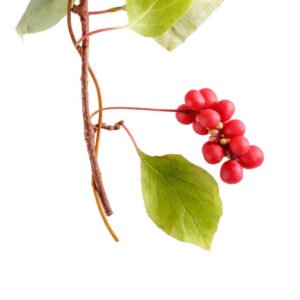
Schisandra (Schisandra chinensis) is a powerful adaptogenic herb widely known for its health-boosting properties. Native to Asia, its berries have been used for centuries in traditional Chinese medicine to improve liver function, boost energy, and promote longevity. Schisandra is particularly beneficial for liver health, offering protection, detoxification support, and even regeneration of liver cells. Let’s explore the key benefits of Schisandra for the liver.
1. Liver Protection
One of the primary benefits of Schisandra is its ability to protect the liver from damage. The liver is constantly exposed to toxins, medications, and environmental pollutants that can lead to oxidative stress and inflammation. Schisandra contains a range of antioxidants, including lignans, which help neutralize free radicals and prevent damage to liver cells.
How it Helps:
- Shields the liver from toxins.
- Reduces oxidative stress and inflammation.
- Protects liver cells from damage caused by external factors like alcohol or pollution.
2. Enhances Liver Detoxification
Schisandra is known to support the liver’s detoxification processes. The liver is responsible for filtering toxins from the blood and converting them into compounds that can be safely eliminated from the body. Studies have shown that Schisandra can enhance the activity of liver enzymes, particularly those involved in detoxification, such as glutathione. This makes it especially useful in helping the liver break down and remove harmful substances more efficiently.
How it Helps:
- Stimulates liver enzymes for better detoxification.
- Improves the liver’s ability to process and remove toxins.
- Aids in overall liver cleansing and detox.
3. Regenerates Liver Cells
Schisandra doesn’t just protect the liver; it also promotes the regeneration of liver cells. This is particularly important for individuals suffering from liver damage due to alcohol, fatty liver disease, or other conditions. Schisandra’s lignans stimulate the liver’s regenerative capacity, helping to repair and rebuild damaged liver tissue, improving overall liver function over time.
How it Helps:
- Promotes liver cell regeneration.
- Supports the healing of damaged liver tissue.
- Improves overall liver function and health.
4. Reduces Liver Inflammation
Chronic inflammation in the liver can lead to serious conditions like fatty liver disease, cirrhosis, or even liver cancer. Schisandra has strong anti-inflammatory properties that can reduce liver inflammation and support long-term liver health. By reducing inflammation, Schisandra helps prevent further liver damage and promotes a healthier liver environment.
How it Helps:
- Lowers liver inflammation.
- Prevents the progression of liver diseases.
- Protects against chronic inflammatory conditions like hepatitis.
5. Improves Liver Enzyme Levels
Abnormal liver enzyme levels are often a sign of liver stress or damage. Studies suggest that Schisandra may help normalize liver enzyme levels, which is crucial for maintaining liver health. In clinical settings, Schisandra has been used to help individuals with elevated liver enzymes due to conditions like hepatitis or toxic exposure, helping to bring their levels back to a healthy range.
How it Helps:
- Balances liver enzyme levels.
- Supports recovery from liver stress or damage.
- Helps in the management of liver-related conditions like hepatitis.
Conclusion
Schisandra is a powerful ally when it comes to liver health, offering protection, detoxification, regeneration, and anti-inflammatory benefits. Whether you are looking to support your liver’s natural detox processes or recover from liver damage, Schisandra can be an effective and natural option. However, it is always wise to consult with a healthcare provider before incorporating any herbal supplements, especially if you have an existing liver condition or are taking medications.
Lemon balm
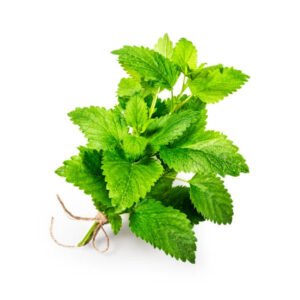
Lemon balm (Melissa officinalis) is a fragrant herb from the mint family, known for its calming and soothing properties. While it’s often used to reduce anxiety, promote sleep, and ease digestive issues, lemon balm also has several benefits for liver health. This article will explore how lemon balm supports liver function and why it can be a valuable addition to a liver-friendly lifestyle.
1. Antioxidant Properties Protect Liver Cells
One of the most significant benefits of lemon balm for the liver is its strong antioxidant capacity. Antioxidants help neutralize harmful free radicals in the body that can damage liver cells and contribute to liver diseases. Lemon balm contains compounds like rosmarinic acid, which help protect liver cells from oxidative stress and prevent cell damage.
2. Anti-Inflammatory Effects
Inflammation in the liver can lead to serious health issues, such as fatty liver disease, hepatitis, and cirrhosis. Lemon balm has natural anti-inflammatory properties that can help reduce liver inflammation. By lowering inflammation, lemon balm may help prevent or alleviate the progression of liver diseases.
3. Supports Detoxification
The liver is the body’s primary detoxification organ, filtering toxins from the blood. Lemon balm aids the liver in this detox process by promoting the production of bile, which helps break down fats and flush toxins from the body. This support for detoxification can improve overall liver function, helping the body efficiently process and eliminate harmful substances.
4. Potential Hepatoprotective Effects
Some studies suggest that lemon balm has hepatoprotective (liver-protecting) effects, meaning it may help shield the liver from damage caused by toxins, alcohol, and other harmful substances. This makes lemon balm an excellent herb to consider for people exposed to liver stress or those looking to prevent liver damage.
5. Improves Digestion
A healthy liver is essential for efficient digestion, and lemon balm’s ability to support digestion is another way it indirectly benefits liver health. Lemon balm helps soothe digestive issues like bloating and indigestion, which can relieve pressure on the liver. By promoting better digestion, lemon balm allows the liver to focus on other vital tasks, like detoxification and nutrient metabolism.
Conclusion
Lemon balm offers numerous benefits for liver health, from protecting liver cells with its antioxidant properties to supporting detoxification and reducing inflammation. By incorporating lemon balm into your diet, either as a tea, supplement, or culinary herb, you can help promote liver function and maintain overall wellness. However, as with any herb, it’s essential to consult a healthcare provider before using lemon balm, especially if you have liver concerns or are on medication. With its gentle yet powerful effects, lemon balm can be a valuable ally in supporting long-term liver health.
Dandelion
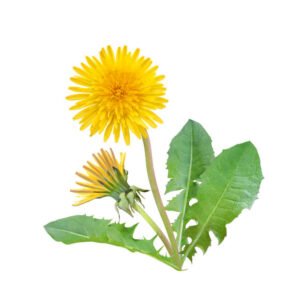
Dandelion (Taraxacum officinale), often viewed as a common weed, is actually a powerful medicinal herb with a long history of use in traditional healing practices. One of its most significant benefits is its positive impact on liver health. From promoting detoxification to aiding digestion, dandelion offers a range of benefits that make it a valuable ally for supporting liver function.
1. Promotes Liver Detoxification
Dandelion root is renowned for its ability to stimulate liver detoxification processes. The liver is responsible for filtering toxins from the bloodstream, and dandelion helps to enhance this function by increasing the production of bile. Bile, produced by the liver, is essential for breaking down fats and eliminating waste products from the body. By boosting bile production, dandelion assists the liver in flushing out harmful substances more effectively.
2. Supports Digestion and Bile Flow
In addition to its detoxifying properties, dandelion root improves digestion by facilitating the flow of bile. When the liver produces more bile, it aids in breaking down fats during digestion, preventing them from accumulating in the liver. This can reduce the risk of developing conditions such as fatty liver disease, which is linked to poor fat metabolism and digestion.
3. Anti-Inflammatory and Antioxidant Properties
Dandelion is rich in antioxidants and has anti-inflammatory properties that are highly beneficial for the liver. Antioxidants help to neutralize free radicals, which can cause oxidative stress and damage to liver cells. This oxidative damage is a significant factor in the development of liver disease. By providing a natural source of antioxidants, dandelion helps protect the liver from such damage, reducing the risk of liver conditions like cirrhosis and hepatitis.
4. Prevents and Manages Liver Disease
Dandelion’s liver-protective qualities have made it a popular remedy for managing liver conditions. Its ability to support bile production, enhance detoxification, and reduce inflammation can help in both the prevention and management of liver diseases. While it is not a cure for liver disease, its role in promoting liver health can be a helpful supplement to medical treatments for conditions like hepatitis, cirrhosis, and non-alcoholic fatty liver disease (NAFLD).
5. Natural Diuretic
Dandelion is also known for its diuretic properties, which can help reduce water retention and relieve the burden on the liver. By promoting the elimination of excess fluids from the body, dandelion ensures that the liver is not overwhelmed by excess waste, allowing it to function more efficiently. This diuretic effect can be particularly beneficial for people suffering from liver conditions where water retention and bloating are common symptoms.
Conclusion
Dandelion is a natural powerhouse when it comes to promoting liver health. From stimulating detoxification to protecting liver cells from oxidative damage, dandelion root offers a wide range of benefits. Whether you are looking to prevent liver problems or support your liver’s natural detoxification processes, incorporating dandelion into your routine—either as a tea, tincture, or supplement—can be a valuable step towards better liver health. However, it’s important to consult with a healthcare professional before using dandelion, especially if you have an existing liver condition or are taking medications.
Ginger
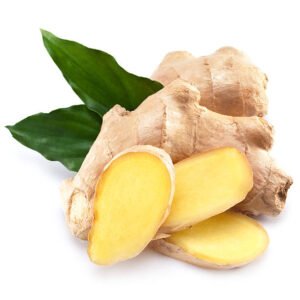
Ginger, a common spice with a rich history in traditional medicine, is not only known for its ability to enhance the flavor of dishes but also for its remarkable health benefits. Among its many advantages, ginger has been recognized for its positive impact on liver health. This powerful root contains bioactive compounds that can aid in detoxification, reduce inflammation, and protect the liver from various forms of damage. Let’s explore the specific benefits of ginger for liver health.
1. Protects Against Liver Inflammation
Chronic inflammation is a major factor contributing to liver diseases such as fatty liver disease, hepatitis, and cirrhosis. Ginger contains potent anti-inflammatory compounds like gingerol and shogaol, which help reduce inflammation in the liver. Regular consumption of ginger may alleviate inflammation and prevent liver damage caused by prolonged inflammatory responses.
2. Promotes Liver Detoxification
One of the liver’s primary functions is to detoxify the body by breaking down toxins, chemicals, and metabolic waste. Ginger has been shown to enhance the liver’s detoxifying abilities, supporting its role in processing and eliminating toxins. It stimulates the production of enzymes that help break down harmful substances, making it easier for the liver to cleanse the bloodstream.
3. Supports Fat Metabolism and Reduces Fatty Liver
Non-alcoholic fatty liver disease (NAFLD) is becoming increasingly common due to poor diet and sedentary lifestyles. Ginger has been found to improve fat metabolism in the liver, helping reduce the accumulation of fat in liver cells. This can be particularly beneficial for those suffering from or at risk of developing NAFLD, as it aids in the breakdown and elimination of excess fat from the liver.
4. Rich in Antioxidants
Ginger is packed with antioxidants that help protect the liver from oxidative stress, a condition that occurs when there is an imbalance between free radicals and antioxidants in the body. Oxidative stress is a major contributor to liver damage and can lead to diseases such as fibrosis and cirrhosis. The antioxidants in ginger, such as gingerol, help neutralize free radicals and protect liver cells from damage.
5. May Prevent Liver Fibrosis
Liver fibrosis is the excessive buildup of scar tissue in the liver, often a precursor to cirrhosis. Research suggests that ginger can help inhibit the process of liver fibrosis by reducing inflammation and oxidative stress. Its anti-inflammatory and antioxidant properties work together to prevent the progression of fibrosis and protect liver function.
6. Helps with Digestive Health, Benefitting the Liver
The liver plays a key role in digestion, particularly in bile production, which helps in breaking down fats. Ginger aids digestion by stimulating the production of bile and promoting the proper functioning of the digestive system. Improved digestion reduces the workload on the liver, allowing it to focus on its primary detoxification and metabolic tasks.
Conclusion
Ginger is a versatile root with numerous benefits for liver health. Its anti-inflammatory, antioxidant, and detoxifying properties make it an excellent natural remedy for maintaining liver function and protecting it from damage. Incorporating ginger into your diet, whether as a tea, spice, or supplement, can help support your liver’s health. However, as with any natural remedy, it’s important to consult a healthcare provider, especially if you have an existing liver condition or are taking medication.
And see more plants beneficial for the liver here
It’s important to note that while these plants have shown potential benefits for liver health, it’s always best to consult with a healthcare professional before adding them to your diet or taking them in supplement form. This is especially true if you have a history of liver disease or are taking medications that affect the liver, as these plants may interact with certain medications and could potentially cause harm if consumed in excess. It’s better to err on the side of caution and seek the advice of a qualified medical professional before making any significant changes to your diet or supplement regimen.
References
- R Saller , R Meier, R Brignoli – The use of silymarin in the treatment of liver diseases – DOI: 10.2165/00003495-200161140-00003
- Iulia Olimpia Pfingstgraf, Marian Taulescu,Raluca Maria Pop –Protective Effects of Taraxacum officinale L. (Dandelion) Root Extract in Experimental Acute on Chronic Liver Failure – doi: 10.3390/antiox10040504
- Mohammad Hosein Farzaei , Mahdi Zobeiri , Fatemeh Parvizi – Curcumin in Liver Diseases: A Systematic Review of the Cellular Mechanisms of Oxidative Stress and Clinical Perspective – DOI: 10.3390/nu10070855
- Yunes Panahi , Parisa Kianpour, Reza Mohtashami – Efficacy of artichoke leaf extract in non-alcoholic fatty liver disease: A pilot double-blind randomized controlled trial – DOI: 10.1002/ptr.6073
- Jae-Chul Jung, Yun-Hee Lee, Sou Hyun Kim – Hepatoprotective effect of licorice, the root of Glycyrrhiza uralensis Fischer, in alcohol-induced fatty liver disease – doi: 10.1186/s12906-016-0997-0

Awesome